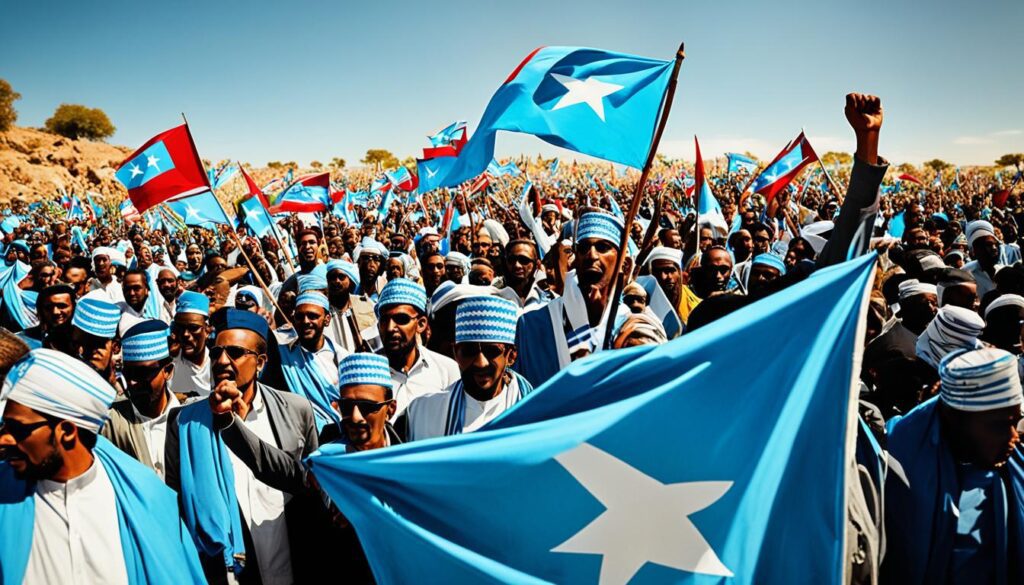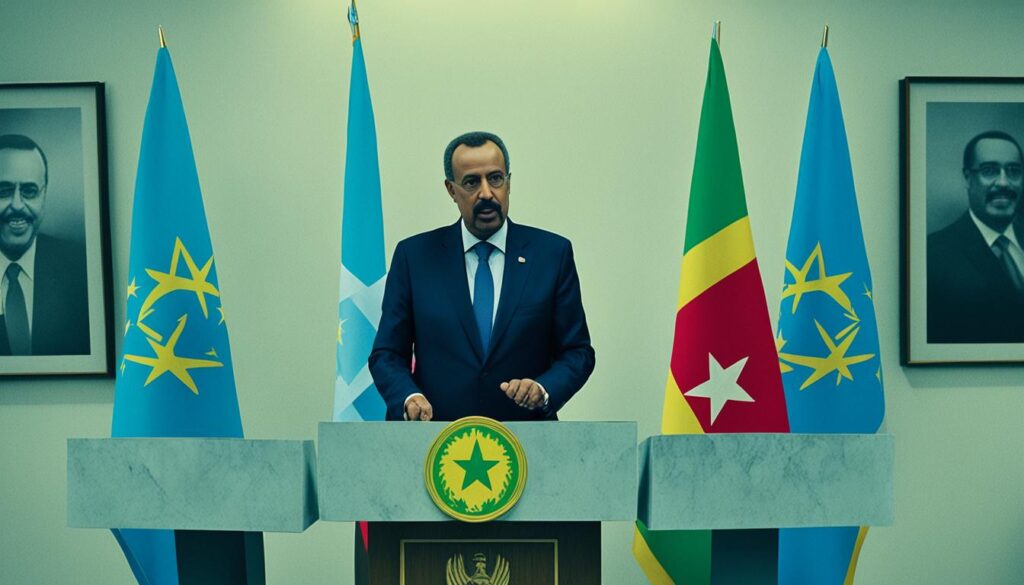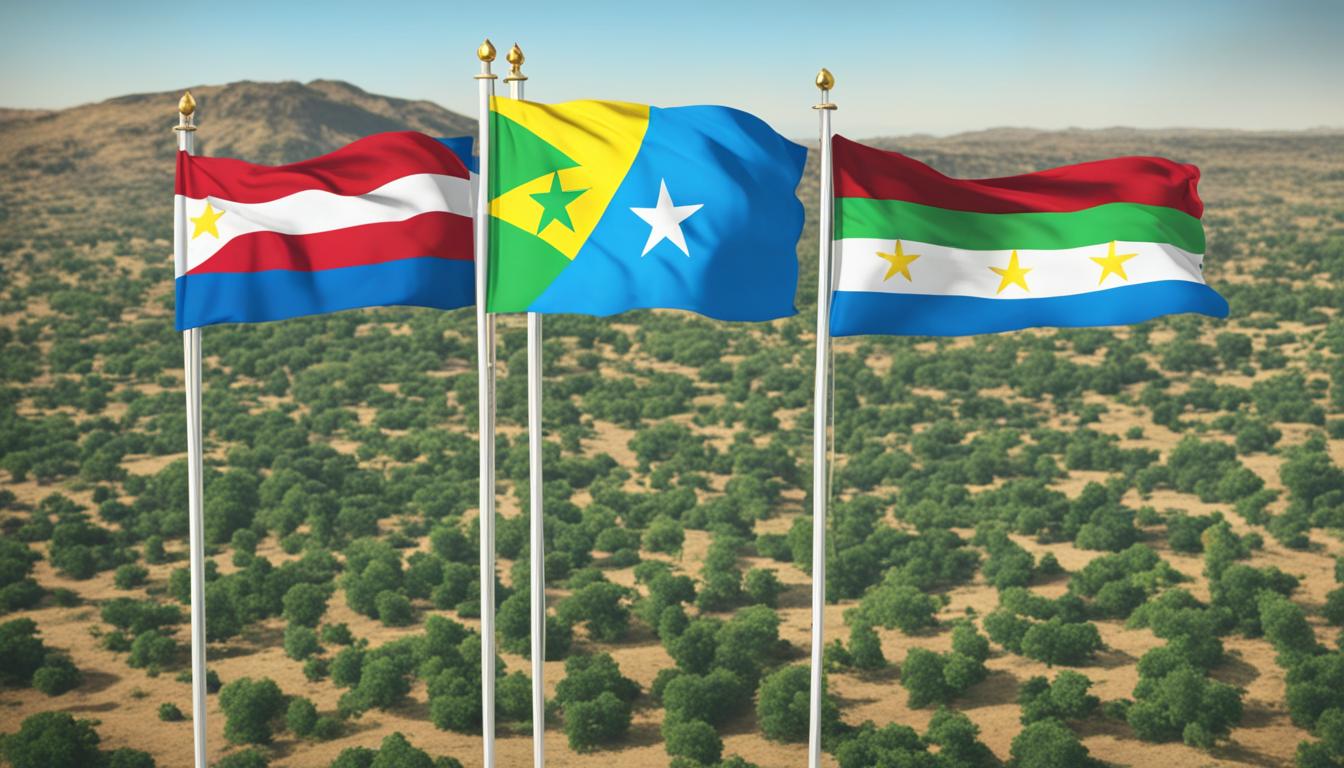Are Ethiopia and Somalia Allies?
Did you know that Ethiopia and Somalia share a border that stretches over 1,640 kilometers? This surprising fact highlights the geographical proximity of these two countries and the potential impact their relationship can have on the region.
Exploring the diplomatic ties and historical background between Ethiopia and Somalia is essential to understand the complexities of their relationship. From ancient ties to modern conflicts and recent cooperation, their dynamic has evolved over time.
In this article, we will delve into the historical origins of their relationship, examine the modern period marked by conflicts and cooperation, analyze recent developments and controversies, and explore the implications for peace and stability in the region. We will also discuss global perspectives and mediation efforts, providing insight into the future prospects of Ethiopia-Somalia relations.
Key Takeaways:
- Despite conflicts in the past, Ethiopia and Somalia have a longstanding history of diplomatic relations.
- The port agreement between Somaliland and Ethiopia has raised tensions and sparked controversy between Somalia and Ethiopia.
- The future dynamics of Ethiopia-Somalia relations and regional stability depend on effective mediation and increased regional cooperation.
- Global actors, including the United States and international organizations, play a crucial role in shaping the outcome of Ethiopia-Somalia relations.
- The complex relationship between Ethiopia and Somalia has broader implications for peace, stability, and economic development in the Horn of Africa.
Historical Origins of the Relationship
The relationship between Ethiopia and Somalia has deep historical roots, with both countries sharing a common origin and ancient ties. However, throughout history, conflicts and tensions have also marred their relationship, shaping the dynamics between the two nations.
Records of hostilities between Ethiopia and Somalia can be traced back to the 14th century, highlighting the longevity of their disagreements. These conflicts have often revolved around territorial disputes and competition for resources, contributing to strained relations over the centuries.
“The historical tensions between Ethiopia and Somalia have left a lasting imprint on their relationship, shaping the complexities and challenges they face today.”
Despite the conflicts, it is important to acknowledge the existence of cultural, economic, and religious affinities that have historically bound Ethiopia and Somalia together. These shared elements can be seen in various aspects, such as the shared Somali and Oromo ethnicities, the influence of Islam in both nations, and their interconnectivity through trade routes in the ancient Horn of Africa.
“The historical origins of the relationship between Ethiopia and Somalia reflect the intricate interplay between cooperation and conflict, showcasing the complex nature of their engagement.”
To visualize the historical timeline of Ethiopia-Somalia relations, below is a table highlighting key events and conflicts:
| Timeline of Ethiopia-Somalia Relations | |
|---|---|
| 14th Century | First mention of hostilities between Ethiopia and Somalia |
| 19th Century | Ethiopia and Somalia engage in trade and cultural exchange |
| 20th Century | Conflicts arise over the Ogaden region, leading to the Ogaden War in the 1970s |
| 21st Century | Efforts towards regional cooperation and counterterrorism initiatives |
“Understanding the historical origins of the relationship between Ethiopia and Somalia provides valuable insights into the complexities and dynamics that shape their engagement in the present day.”
Modern Period
In the modern period, tensions between Ethiopia and Somalia have persisted, leading to conflicts and territorial disputes. One notable conflict was the Ogaden War in the 1970s, where Somalia aimed to incorporate the Ogaden region into Greater Somalia. This conflict resulted in a shift in the dynamics of the region, as Somalia was eventually pushed out of the Ogaden.
Despite these conflicts, there have also been periods of cooperation and shared interests between Ethiopia and Somalia. Both countries have recognized the importance of regional stability and have worked together on various issues of mutual concern.
“We need to acknowledge that our destinies are intertwined and that cooperation is essential for the progress and well-being of our countries and the entire region.”
Cooperation between Ethiopia and Somalia has extended to areas such as security, trade, and regional development. For example, the two countries have collaborated in joint military operations and peacekeeping efforts, demonstrating their shared commitment to peace and stability.
Furthermore, Ethiopia and Somalia have recognized the benefits of fostering economic ties and promoting cross-border trade. By facilitating trade routes and removing barriers, they aim to boost economic growth and enhance regional integration.
Highlights of Modern Period:
- Conflicts and territorial disputes, including the Ogaden War
- Shift in regional dynamics
- Periods of cooperation and shared interests
- Collaboration in security and peacekeeping
- Fostering economic ties and cross-border trade
In the next section, we will discuss recent developments and cooperation between Ethiopia and Somalia, shedding light on their evolving relationship and its implications for the region.
Recent Developments and Cooperation
In recent years, Ethiopia and Somalia have been working towards improving their relations and fostering cooperation, aiming for a stronger and more stable region. These efforts have included joint initiatives and military operations, showcasing their commitment to addressing common challenges and promoting peace.
One important example of their cooperation took place in 2006, when Ethiopian troops provided support to the Somali Transitional Federal Government in its fight against the Islamic Courts Union. This joint effort demonstrated their shared determination to combat terrorism and safeguard regional security.
“Our collaboration with Somalia has been instrumental in tackling the threats posed by extremist groups and ensuring the stability of our countries. Through our strategic alliance, we have strengthened our forces and deepened our cooperation, paving the way for a more prosperous and peaceful future for the region.”
– Ethiopian Government Spokesperson
Alongside counterterrorism efforts, both Ethiopia and Somalia have actively participated in regional peacekeeping missions, contributing to the maintenance of peace and stability in the Horn of Africa. Their joint military operations have played a crucial role in preventing the escalation of conflicts and fostering greater regional unity.
The Strategic Alliance for Stability
The recent developments in Ethiopia-Somalia relations highlight a strategic alliance built upon shared interests and a commitment to regional stability. By pooling their resources and expertise, both countries have shown their dedication to finding common solutions to regional challenges, fostering understanding, and promoting lasting peace.
This cooperation goes beyond military endeavors and extends to broader areas of bilateral engagement, including trade, infrastructure development, and diplomatic relations. By strengthening their ties and collaboration, Ethiopia and Somalia are building a foundation for mutual growth and prosperity.
Somali Independence and Relations with Somaliland

After gaining independence from colonial rule in 1960, Somalia’s political landscape was further shaped by the northwestern region of Somaliland, which declared independence. However, despite being a self-declared independent state, Somaliland has not received international recognition.
The relationship between Somalia and Somaliland has been complex, with Somalia considering Somaliland as part of its own territory. This has resulted in tensions and disputes over recognition and sovereignty between the two entities.
| Somalia | Somaliland |
|---|---|
| Declared independence in 1960 | Declared independence in 1991 |
| Recognized internationally | Not internationally recognized |
| Considers Somaliland part of its territory | Seeks full sovereignty |
These conflicting views over Somaliland’s status have contributed to ongoing tensions and hindered efforts to establish stable relations between the two entities. The unresolved issue of recognition continues to be a significant source of contention in Somalia-Somaliland relations.
Ethiopia’s Need for Sea Access
Ethiopia, a landlocked country, has long recognized the importance of gaining access to the sea to support its trade and economic development. Unlike coastal nations, Ethiopia relies on ports in neighboring countries to facilitate its international trade. This dependence on external ports has posed significant challenges and limitations for Ethiopia’s growth and development.
Ethiopia’s reliance on ports in neighboring countries exposes it to various risks and constraints. The distance and logistical complexities involved in transporting goods through multiple countries increase transportation costs, leading to higher prices for imported and exported goods. Moreover, the lack of direct control over these ports limits Ethiopia’s ability to efficiently manage and prioritize its trade activities.
To overcome these challenges, Ethiopia has entered into port agreements with various countries, including Somaliland, a self-declared state within Somalia. These agreements aim to provide Ethiopia with alternative port options and greater control over its trade routes.
One significant port agreement is with Somaliland, granting Ethiopia a 50-year lease of a naval base in the Berbera port. This agreement not only offers Ethiopia access to the Red Sea but also provides strategic advantages in terms of security and stability in the region. By diversifying its port options, Ethiopia can mitigate the risks associated with any disruptions or conflicts that may arise in a single port or transportation route.
| Benefits of Ethiopia-Somaliland Port Agreement | Implications for Ethiopia’s Trade and Development |
|---|---|
| Enhanced Trade Efficiency | Diversified Port Options |
| Reduced Transportation Costs | Greater Control over Trade Routes |
| Increased Regional Security | Strengthened Economic Competitiveness |
| Enhanced Maritime Capabilities | Promotion of Regional Connectivity |
The Ethiopia-Somaliland port agreement has sparked both positive and negative reactions. Supporters argue that it offers Ethiopia the much-needed sea access to spur economic growth and improve regional stability. Critics, on the other hand, express concerns about the agreement’s impact on Somalia’s territorial integrity and potential escalation of tensions in the region.
Overall, Ethiopia’s pursuit of sea access through port agreements reflects its commitment to overcoming its landlocked status and diversifying its trade routes. By securing direct access to the sea, Ethiopia aims to boost its economic development, enhance regional connectivity, and strengthen its position in international trade. However, the long-term implications of these agreements on regional dynamics and stability remain to be seen.
Somaliland-Ethiopia Port Agreement
In recent years, Somaliland and Ethiopia have forged a significant diplomatic partnership through a port agreement that has far-reaching implications for both countries. This agreement grants Ethiopia a 50-year lease of a naval base in Somaliland’s Berbera port, opening up new avenues for Ethiopia to access the Red Sea and diversify its port options.
The somaliland-ethiopia port agreement aims to bolster Ethiopia’s trade and economic opportunities by providing a strategic gateway to the Red Sea. This ensures a more efficient flow of goods and enhances Ethiopia’s regional influence.
The benefits of the agreement extend beyond trade and commerce. In return for the naval base lease, Somaliland stands to gain recognition on the international stage and potentially secure a stake in Ethiopian Airlines, reinforcing the growing partnership between the two nations.
This cooperative venture not only strengthens economic ties but also fosters regional stability and cooperation. Both Somaliland and Ethiopia recognize the mutual benefits of this agreement, demonstrating their commitment to enhancing their diplomatic relations and working together for shared prosperity.
Key Elements of the Somaliland-Ethiopia Port Agreement
| Somaliland | Ethiopia |
|---|---|
| Recognition on the international stage | Access to a strategic naval base |
| Potential stake in Ethiopian Airlines | Expansion of trade and economic opportunities |
This table highlights the key elements of the somaliland-ethiopia port agreement, showcasing the reciprocal benefits for both parties. Somaliland gains recognition and economic opportunities, while Ethiopia secures vital access to the Red Sea and diversifies its port options.
Reactions and Controversies
The port agreement between Somaliland and Ethiopia has stirred up a wave of controversy and escalated tensions between Somalia and Ethiopia. Somalia perceives this agreement as a violation of its territorial integrity and sovereignty. The deal has triggered concerns among several countries and international organizations, urging for restraint in the region. Some even lend their support to Somalia’s position in this matter. The reactions and controversies surrounding this agreement shed light on the intricate dynamics of the region.
Heightened Somalia-Ethiopia Tensions
Somalia’s reaction to the Somaliland-Ethiopia port agreement has intensified existing tensions between Somalia and Ethiopia. The agreement is seen by Somalia as a direct threat to its sovereignty and its ability to control its own ports. This has strained the relations between the two neighboring nations and further complicated the already delicate regional dynamics.
Somalia’s concern over the port agreement stems from its long-held aspiration to reunite with Somaliland, which declared independence after Somalia gained independence in 1960. Somalia views Somaliland as part of its own territory and any agreements made without its consent are seen as infringements on its sovereignty.
International Response and Concern
The endorsement of the Somaliland-Ethiopia port agreement has raised concerns and garnered attention from various countries and international organizations. They have emphasized the need for restraint and a peaceful resolution to avoid further escalation of tensions in the region.
Several nations have expressed support for Somalia’s position, emphasizing the importance of respecting its sovereignty and territorial integrity. These countries believe that the agreement undermines the ongoing efforts towards stability and peace in the Horn of Africa.
The international response to the agreement underscores the complexities surrounding this issue and the significance placed on regional stability and cooperation.
Potential Implications for Peace and Stability

The port agreement between Somaliland and Ethiopia carries significant implications for peace and stability in the region. If not carefully managed, this agreement has the potential to escalate tensions and further exacerbate existing conflicts, posing a risk to the overall stability of the Horn of Africa.
In recent years, the Horn of Africa has struggled with various conflicts and security challenges. The geopolitical dynamics in the region are complex, with multiple states vying for influence and resources. Any development that affects this delicate balance can have far-reaching consequences.
The Somaliland-Ethiopia port agreement, with its implications for trade routes and regional power dynamics, could ignite or intensify conflicts, spreading beyond the immediate territories involved. Given the historical tensions between Somalia and Ethiopia, the agreement has the potential to strain diplomatic relations and trigger a ripple effect of instability.
However, if approached with careful diplomacy and cooperation, the port agreement could also contribute to positive outcomes. The establishment of viable trade routes and enhanced regional integration can foster economic growth and development. Additionally, the agreement offers an opportunity for peacebuilding efforts, as the shared interests of the involved parties could incentivize cooperation and conflict resolution.
“The success of the Somaliland-Ethiopia port agreement lies in the ability of all parties involved to prioritize dialogue and peaceful resolution, mitigating conflict risks and ensuring regional stability.” – Our Research Team
In order to realize the potential benefits of the agreement, it is crucial for all stakeholders to consider the interests and concerns of neighboring countries, international actors, and local communities. Effective coordination and cooperation can help address security concerns and minimize the risk of unintended consequences.
The international community, including neighboring countries and international organizations, should actively engage in facilitating dialogue and supporting peaceful resolution mechanisms. By providing mediation efforts and resources, they can help navigate the complexities of the region and ensure that the port agreement contributes to long-term stability and cooperation.
Potential Conflict Risks and Regional Stability
| Potential Conflict Risks | Impact on Regional Stability |
|---|---|
| Deterioration of diplomatic relations between Somalia and Ethiopia | Increase in tensions and potential for armed conflicts |
| Spillover of conflicts to neighboring territories | Destabilization of additional regions, risking broader conflict |
| Obstruction of existing peacebuilding efforts | Setback in regional reconciliation and cooperation |
| Undermining trust and cooperation among neighboring states | Reduced collaboration on common challenges |
It is essential to recognize the potential risks entailed by the Somaliland-Ethiopia port agreement and actively work towards mitigating them. By prioritizing dialogue, inclusivity, and cooperation, the agreement has the potential to be a catalyst for regional development and stability rather than a source of conflict.
Global Perspectives and Involvement
The stability and development of the Horn of Africa are of great interest to the global community, including the United States and international organizations. We have been closely monitoring and actively participating in the discussions surrounding the port agreement between Somaliland and Ethiopia. Our global involvement in this agreement reflects our commitment to promoting peace, stability, and economic prosperity in the region.
As the United States, we recognize the importance of fostering positive relationships between countries and supporting initiatives that contribute to regional cooperation. We understand that the port agreement between Somaliland and Ethiopia has implications that extend beyond their borders and affect the overall dynamics of the Horn of Africa.
The United States has historic ties with both Somalia and Ethiopia. Our engagement with these countries has been multifaceted, ranging from diplomatic relations to development assistance. We have supported efforts to enhance security, counter-terrorism, and promote democratic governance in the region.
International organizations, such as the African Union and the United Nations, also play a significant role in the region. They provide platforms for dialogue, mediation, and coordination among countries in the Horn of Africa. Their involvement ensures that the interests and concerns of all parties are taken into account when addressing complex regional issues.
| Global Actors | Actions |
|---|---|
| United States | Monitoring and diplomacy |
| African Union | Mediation and conflict resolution |
| United Nations | Peacekeeping and coordination |
Our collective engagement in the region demonstrates a commitment to fostering peace, stability, and sustainable development. By actively participating in the discussions surrounding the Somaliland-Ethiopia port agreement, we aim to ensure that the outcomes contribute to regional integration, economic growth, and the well-being of the people in the Horn of Africa.
Quote:
“Our global involvement in the Somaliland-Ethiopia port agreement shows our commitment to promoting peace, stability, and economic prosperity in the Horn of Africa.” – United States.
By working collaboratively with all stakeholders, we can help create an environment conducive to lasting peace, cooperation, and shared prosperity in the region. It is through our collective efforts that we can shape the future dynamics of Ethiopia-Somalia relations and contribute to a more stable and prosperous Horn of Africa.
Future Prospects and Mediation Efforts

The port agreement between Somaliland and Ethiopia has added another layer of complexity to the ongoing discussions between Somalia and Somaliland. While efforts to mediate and find a mutually acceptable solution to their relationship continue, progress has been slow. The future prospects for the region depend on successful mediation, increased regional cooperation, and the willingness of all parties to find common ground.
“Mediation efforts are key to resolving the longstanding issues between Somalia and Somaliland. Through dialogue and negotiation, we can foster understanding, build trust, and ultimately pave the way for a peaceful and stable future in the region.”
Recognition is also an important aspect of the discussions between Somalia and Somaliland. The question of Somalia-Somaliland recognition remains a contentious issue, with both sides holding firm positions.
In addition to the bilateral dialogue between Somalia and Somaliland, regional cooperation plays a crucial role in shaping the future of the Horn of Africa. Strengthening ties between neighboring countries and fostering regional partnerships can contribute to stability, economic growth, and peacebuilding efforts.
Regional Cooperation Initiatives
- Promoting trade and economic integration to enhance regional development and prosperity.
- Collaborating on security and combating common threats, such as terrorism and extremism.
- Facilitating people-to-people exchanges and cultural diplomacy to foster understanding and build bridges.
- Coordinating efforts in natural resource management and environmental conservation for the sustainable development of the region.
By prioritizing regional cooperation and emphasizing the importance of mediation, the Horn of Africa can overcome its challenges and work towards a future marked by peace, stability, and prosperity.
| Benefits of Regional Cooperation | Challenges |
|---|---|
| Enhanced regional security | Diverging national interests |
| Increased trade and economic opportunities | Historical tensions and conflicts |
| Harnessing collective resources for development | Political complexities and power dynamics |
| Shared knowledge and expertise | Resource management and distribution disputes |
Conclusion
The relationship between Ethiopia and Somalia is a complex mix of historical conflicts, cooperation, and ongoing challenges. The recent port agreement between Somaliland and Ethiopia has further complicated the dynamics in the region. However, the future dynamics of Ethiopia-Somalia relations and regional stability depend on the parties’ ability to navigate their differences and engage in constructive dialogue.
Moving forward, it is crucial for both Ethiopia and Somalia to work towards common goals and find mutually beneficial solutions. The successful implementation of the port agreement and other collaborative efforts can contribute to economic growth, regional integration, and peacebuilding. To achieve these objectives, international support and mediation efforts will play a vital role.
As the global community closely watches the developments in the Horn of Africa, it is in everyone’s interest to ensure a stable and prosperous region. The future of the somaliland- Ethiopia relationship and the broader Ethiopia-Somalia relations will determine the overall regional stability. By prioritizing dialogue and cooperation, the parties involved can shape a positive outcome and contribute to long-term peace and development in the region.






